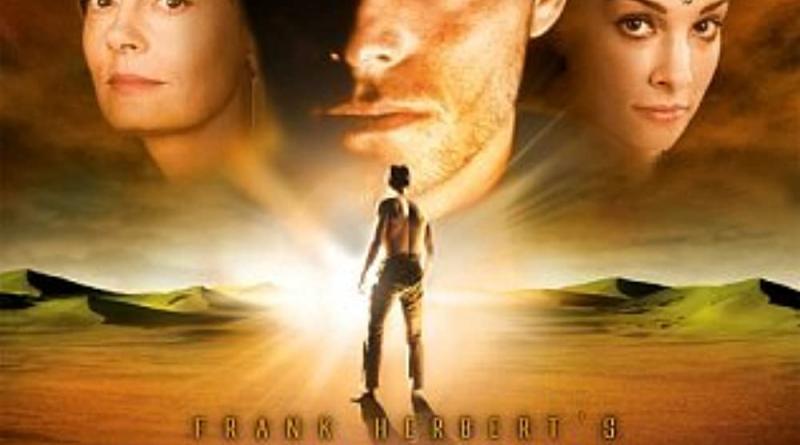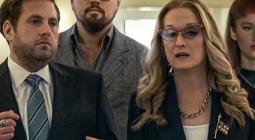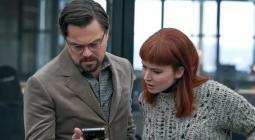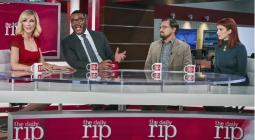Don’t Look Up, dear Children of Dune

“The gift of words is the gift of deception and illusion.”
The reality of climate denial, debate and delay is more than laughable, it was refreshing to feel the validation from Don’t Look Up that our current situation is indeed as incredulous as it seems from the energy frontline.
Don’t Look Up provided a much-needed sense of conviction that we may in fact finally be accepting the meteor is here and we have the tools to disarm the worst impacts, if we continue to fight it early. Every day the scales tip further from defeatism into hope.
That doesn’t discount the gravity of the fight ahead, that there won’t continue to be casualties, and the ongoing emotional toll. A pause to acknowledge the echoes of ‘self-righteousness’. The film captures the sentiment that those driving climate action really don’t give a fuck. There are no hills to die on, no points to prove. Nobody does it for the pats on the back. The only ask is for people - particularly those in power - to listen, to hear, to acknowledge and to act.
As Leo puts in one of the final scenes of the film, while playing ‘Till Then’ the song of troops going to WWII:
Although there are oceans we must cross
And mountains that we must climb
I know every gain must have a loss,
So pray that our loss is nothing but time
Losing oneself in sci-fi has been the greatest solace from climate grief, the grand scale of timelines giving an escape from our impending (albeit avoidable) disaster. There’s strange hope in knowing that even if we destroy the best of our current planet, life will always find a way to evolve.
Many of the themes in Don’t Look Up felt strongly reminiscent of Frank Herbert’s third instalment in the Dune Chronicles. Below quotes are from 1976's Children of Dune, perhaps the dark humour and impactful reach of such a film as Don’t Look Up may mean we begin to take note, 46 years on.
“Limits of survival are set by climate, those long drifts of change which a generation may fail to notice. And it is the extremes of climate which set the pattern. Lonely, finite humans may observe climatic provinces, fluctuations of annual weather and, occasionally may observe such things as ‘This is a colder year than I’ve ever known.’
Such things are sensible. But humans are seldom alerted to the shifting average through a great span of years. And it is precisely in this alerting that humans learn how to survive on any planet. They must learn climate.”
Looking to the data as Dr. Mindy would encourage, extensive evidence of climate change has been collated since the 1900s, with evidence of the atmospheric rise in carbon emissions being directly due to human causes proven since 1988. This would have bought us more than enough time to have begun acting while the economic, environmental and social costs were low.
Yet here we are in 2022, with evidence of climate change impacts becoming a near daily occurrence with bushfires, storm surges, ice and permafrost melt, loss of habitats and species accelerating. Our hottest days, months and years on record are consistently beaten, while we are fed a staple diet of fossil fuels, fast fashion and factory farms.
Luckily there are increasing winds of change. We can ride these into a better future, acknowledging we live in an ever-changing environment, and our frame of decision-making must be designed to ride with these winds. Nothing like a pandemic and its continuous variants has shown this more.
“Most deadly errors arise from obsolete assumptions.”
Don’t Look Up highlighted - through the worst case scenario - the importance of scenario analysis, peer review, listening to the evidence, acting as soon as possible, and pivoting when the assumptions change to remain ahead of the game.
Even the subtle early communications of the meteor being ‘6–9km wide’ later being confirmed as ‘9km wide’ is reminiscent of the ‘1–2°C warming’. As 1°C is no longer achievable due to our persistent denial, debate and delay, and that the goal is now to remain within 2°C (9km in meteor terms). Although a 2– 3°C range of warming will still have devastating impacts, this is a level we can at least make efforts to adapt to, while mitigating the very worst case scenario of 3–4+°C.
We can go there but I did promise to keep things light.
“We’ve lost something vital, I tell you. When we lost it, we lost the ability to make good decisions. We fall upon decisions these days the way we fall upon an enemy — or wait and wait, which is a form of giving up, and we allow the decisions of others to move us. Have we forgotten that we were the ones who set this current flowing?”
As Faux-President Janie Orleans responded upon receiving the science, ‘Sit tight and assess’. Avoid making any decisions until the next election cycle. Unless it suits the election campaign, in which case carefully design a climate and energy policy that prioritises the commercial powers of political donors, such as the unsettling, deep-pocketed influence of Bash CEO.
As a country deeply entrenched in economic growth based on resources and fossil fuels, energy and climate policy has remained political suicide for the past three decades. Instead, we downplay our emissions and campaign for lower carbon reduction targets, while our elected leaders remain hamstrung by political donors heavily leveraged in fossil fuels, successfully lobbying for a gas-led economic recovery despite the lack of economic, environmental and social evidence to support this strategy.
Resistant to economic peer review, our Federal Government’s modelled net zero scenarios are through the lens of one ‘independent’ McKinsey report, based on unproven technologies and long-term 2050 targets. The best economic outcome would be to implement the lowest hanging tangible fruit in the next ten years while the economic cost of climate change mitigation is low and risk of irreversible global warming feedback loops is high, before we foot the much larger bill of a climate change adaptation strategy. But that wouldn’t suit the election cycle.
“Good governance never depends upon laws, but upon the personal qualities of those who govern. The machinery of government is always subordinate to the will of those who administer that machinery. The most important element of government, therefore, is the method of choosing leaders.”
One benefit of a short-term election cycle is the near-term demand to keep our leaders accountable, as they must maintain popular vote to remain in power. To retain the integrity of democracy and not become beholden to short-term election promises over policy implementation, we must return to first principles of representative democracy. Not which party has the most votes and how they can win the next election, but which party best represents the interests of the people that elect them, not the powers of their donors.
We could improve our ‘method of choosing leaders’ by removing or limiting political donations, but more importantly, ensuring fair communication and transparency of the proposed policies of each campaigning party. And for that we need diverse and independent media.
Our political system isn’t entirely broken, the fundamentals and first principles are strong. There remains an opportunity to achieve significant progress in electing more representative leaders driven by integrity and desire to create a better society, and demanding transparent leadership on any and all sides of a political fence.
We can demand a fair and equal platform for policy and values-led campaigns, not scare tactics and fear campaigns, and remain aware of the media bias that plagues our platforms today. We can feel empowered in our votes, our democracy, our representation and our fairly paid taxes being distributed in ways that more strongly align with our values. We can select how we consume our media, challenge our assumptions, pressure our politicians when they don’t meet expectations.
“We know the major conditions wherein this large populace may turn upon its keepers
One: When they find a leader. This is the most volatile threat to the powerful; they must retain control of leaders.
Two: When the populace recognises its chains. Keep the populace blind and unquestioning.
Three: When the populace perceives a hope of escape from bondage. They must never even believe that escape is possible!”
Jonah Hill as Chief of Staff begins to lose the veil of ‘media training’ in an address clearly separating the working class, the ruling class, and the imagined ‘them’ driving a fear-based narrative to tighten the chains, ensuring a populace malleable to the will of those wielding power, whether it be government, media, corporations that are openly designed to be profit-maximising machines. Not necessarily a bad design in and of itself, however when we do not factor in the negative externalities of environmental or social (i.e. human) cost, we face damaging incentive misalignment.
We are increasingly at Stage Three of Frank Herbert’s view, and cannot lose sight of the fact that escape is very possible, even with small adjustments to our current systems.
Increased accountability through environmental and social cost reporting, carbon taxes, legislated carbon targets and tangible net zero pathways based on technically and commercially proven execution plans, would set us on a much stronger trajectory to potentially remaining within 2°C of warming, even without radical economic system change.
We can shift our focus to demanding reforms to big tech and social media, worth challenging to more ethically align big data business models with the interests of their users (us-losers). Wouldn’t we be open to regulating the attention economy like we regulated CFCs to recover the ozone layer, or imposing emissions standards on fossil fuel consumption? The path has been worn, and can be forged ahead.
“Peace demands solutions, but we never reach living solutions; we only work toward them. A fixed solution is, by definition, a dead solution. The trouble with peace is that it tends to punish mistakes instead of rewarding brilliance.”
“Every question, every problem doesn’t have a single correct answer. One must permit diversity. A monolith is unstable.”
The opportunity to create beyond our wildest dreams can empower us to harness entropy as a force for fun and imagination.
But what’s the meaning of it all?
“There’s no mystery about a human life. It’s not a problem to be solved, but a reality to be experienced.”
“The joy of living, its beauty is all bound up in the fact that life can surprise you.”
And so, we live in anticipation of all that remains to surprise us along the way, the joy of living to the full depths of existence within this uncertain reality.
Poetically swept up in Timothée Chalamet’s world-ending prayer, may we face whatever is to come with courage and open hearts of acceptance.
The universe is just there; that’s the only way a Fedaykin can view it and remain the master of his senses.
The universe neither threatens nor promises.
It holds things beyond our sway: the fall of a meteor, the eruption of a spiceblow, growing old and dying.
These are the realities of this universe and they must be faced regardless of how you feel about them. You cannot fend off such realities with words.
They will come at you in their own wordless way and then, then you will understand what is meant by “life and death.”
Understanding this, you will be filled with joy.— MUAD’DIB TO HIS FEDAYKIN





